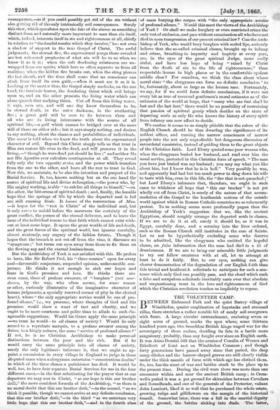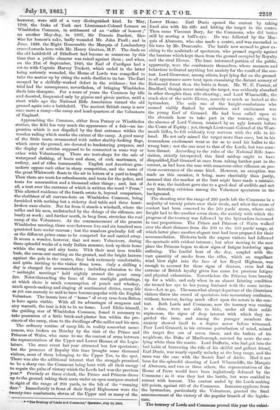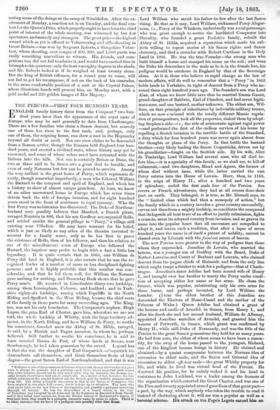THE VOLUNTEER CAMP
DETWEEN Richmond Park and the quiet Surrey village of II Wimbledon, quaint combination of haystacks and stuccoed villas, there stretches a rather notable bit of sandy soil overgrown with furze. A large circular entrenchment, enclosing seven or- eight acres of ground, marks the spot where, some thirteen hundred years ago, tivo breechless British kings waged war for the sovereignty of these realms, deciding its fate in a battle more sanguinary, probably, than any fought ever since on English earth. It was Anno Domini 568 that the armies of Ceaulin of Wessex and Ethelbert of Kent met on Wimbledon Common ; and though forty generations have passed away since that period, the deep camp ditches and the barrow-shaped graves are still clearly visible under the thick mantle of furze with which age has clothed them. So, too, has the scent of war and battles stuck to the place up to the present time. During the civil wars there was more than one encounter within and near the ancient British camp ; in Crom- well's period it was a pet ground for skirmishes between Cavaliers- and Roundheads, and one of the generals of the Protector, valiant John Lambert, liked it so well that he purchased the whole estate, growing tulips and gilliflowers on the margin of the historical tumuli. Somewhat later, there was a fall in the martial dignity of the ground, the battles sinking into duels. The latter,
however, were still of a very distinguished kind. In May, 1789, the Duke of York met Lieutenant-Colonel Lennox on Wimbledon Common, in settlement of an "affair of honour ;'' on another May-day, in 1807, Sir Francis Burdett, like- wise for honour's sake, badly wounded Mr. John Paull ; and in June, 1889, the Right Honourable the Marquis of Londonderry crossed swords here with Mr. Henry Grattan, M.P. The duels on -the old battlefield of Ethelbert had become so numerous by this time that a public clamour was raised against them ; and when, on the 21st of September, 1840, the Earl of Cardigan had a set-to with Captain Harvey Tuckett, which ended in the latter being seriously wounded, the House of Lords was compelled to take the matter up by citing the noble duellist to its bar. The Earl escaped by a skilfully-worked defect in the evidence ; but the trial bad the consequence, nevertheless, of bringing Wimbledon duels into disrepute. For a score of years the Common lay idle and deserted, frequented only by gipsies and picnic parties, until a short while ago the National Rifle Association turned the old ground again into a battlefield. The ancient British camp is now once more a camp—the camp and head-quarters of the Volunteers of England.
Approaching the Common, either from Putney or Wimbledon station, the field has very much the appearance of a fair—an im- pression which is not dispelled by the that entrance within the wooden railing which marks the extent of the camp. A good many of the little tents, ornamented with rather shabby-looking flags, which cover the ground, are devoted to huckstering purposes, and the display of articles supposed to be connected in some way or other with Volunteering. There are tent-shops for the sale of waterproof clothing, of boots and shoes, of cork mattresses, of cutlery, and of rifles innumerable. English and American gun- makers oppose each other in sharp competition, and the name of the great Whitworth floats in the air in letters of a yard in length. Then there are tents for refreshments, and tents for the police, and tents for ammunition and a thousand other things ; and, last of all, a tent over the entrance of which is written the word "Press." This allotted residence of the fourth estate is, beyond comparison, the shabbiest of all canvass-huts on Wimbledon Common, being furnished with nothing but a ricketty deal table and three heart- broken cane chairs. Not far from it stands a windmill, where the miller and his men, undisturbed by the doings of the riflemen, are busily at work ; and further north, in long lines, stretches the real camp of the Volunteers. At the commencement of the present Wimbledon meeting, there were between five and six hundred men quartered here under canvass ; but the numbers gradually fell off as the different prizes came to be competed for and carried away. It seems a wonder, however, that not more Volunteers, during these splendid weeks of a truly Italian summer, took up their home within the snug and airy tents. With their neat iron truckle beds, the cocoa-nut matting on the ground, and the bright lantern against the pole in the centre, they look extremely comfortable, and quite inviting to the visitor from town. Only a shilling a day is charged for accommodation ; including admission to the " midnight meetings" held nightly around the great camp fire. Notwithstanding the fame of these starlight gatherings, at which there is much consumption of punch and whiskey, much speech-making and singing of sentimental ditties, camp life as yet can scarcely be said to have become popular with the English Volunteer. The innate love of " home " of every true-born Briton is here again visible. With all its advantages of snugness and airy warmth, the tent is felt to be no home. Lord Elcho himself, the guiding star of Wimbledon Common, found it necessary to
take possession of a little brick-and-plaster box within the pre- cincts of the camp, close to the dwellings ofthe miller and his men. The ordinary routine of camp life, in reality somewhat mono- tonous, was broken on Monday by the visit of the Prince and Princess of Wales, who came to see the contest of arms between the representatives of the Upper and Lower Houses of the Legis- lature. The same event last year attracted but few spectators ; but the presence of Royalty this time 12rought some thousand visitors, most of them belonging to the Upper Ten, to the spot. There was also the additional interest that the struggle promised to be a sharp one, the Commons being bent with all their energy to regain the palm of victory which the Lords had won the previous year.* Precisely at three o'clock, the Prince and Princess drove up to the ground, taking their seats under an open marquee erected in sight of the range of 200 yards, to the left of the "running deer." Immediately in front of their Royal Highnesses were the twenty-two combatants, eleven of the Upper and as many of the
• "The Toarney of Lords and Commons," Spociator, July 12, 1802.
Lower House. Earl Dude opened the contest by taking fixed aim with his rifle and hitting the target in the centre. Then came Viscount Bury, for the Commons, who did better still by scoring a bull's-eye. He was followed by the Mar- quis of Abereorn, who also made a centre, and was succeeded in his turn by Mr. Duncombe. The battle now seemed to grow ex- citing to the multitude of spectators, who pressed eagerly against the barriers which kept -them from the ground occupied by Royalty and the rival Eleven. The least interested portion of the public, apparently, were the combatants themselves, whose manners and behaviour indicated anything but anxiety for the result of the con- test. Lord Grosvenor, among others, kept lying flat on the ground to all appearance more bent upon examining the distant scenery of Richmond forest than the butts in front. Mr. W. E. Forster, of
Bradford, though never missing the target, was evidently absorbed in other thoughts than rifle-shooting ; and Lord Wharncliffe, the crack shot of the noble Eleven, scarcely so much as looked at the bystanders. The only one of the knight-combatants who seemed visibly flushed by animation and excitement was the young Earl of Granard. He bad been called upon at the eleventh hour to take part in the tourney, owing to the absence of Lord Vernon, retained by an ugly lawsuit before the Court of Equity ; yet, though Lieutenant-Colonel of the West- meath Rifles, he felt evidently very nervous with the rifle in his hand. He not only missed the target more than once, but in his tremendous excitement went so far as to send his bullet to the wrong butt ; not the one next to that of the Lords, but two num- bers distant. According to the rules of the National Rifle Asso- ciation, strictly interpreted, this fatal mishap ought to have disqualifiekEarl Granard at once from taking further part in the contest, as had been the case with numerous other riflemen on pre- vious occurrences of the same kind. However, an exception was made on this occasion, it being, more charitably than justly, assumed that the marker at the butt might have made a mistake. As it was, the incident gave rise to a good deal of audible and not very flattering criticism among the Volunteer spectators in the background.
The shooting over the range of 200 yards left the Commons in a majority of twenty points over their rivals, and when the scene of contest had been removed to the 500 yards' arena, where each knight had to fire another seven shots, the anxiety with which the progress of the tourney was followed by the bystanders increased in vast proportions. The Prince and Princess of Wales walked over the short distance from the 200 to the 500 yards' range, at which latter place another elegant tent had been prepared for their accommodation. Hitherto both the august visitors had followed the spectacle with evident interest ; but after moving to the new place the Princess began to show signs of fatigue bordering upon suffering. The fearful heat of the day, coupled with the Test quantity of smoke from the rifles, which an ungallant wind blew right into the face of her Royal Highness, was enough to account for these signs of distress, even had the extreme of British loyalty given less cause for previous fatigue and physical exhaustion. Nevertheless the Princess bore bravely up for a while, and only when in an almost fainting condition she turned her eye to her young husband with the mute invita- tion—Let us go. The somewhat abrupt departure of the illustrious visitors threw the crowd of spectators into momentary confusion, without, however, having much effect upon the actors in the con- test. Both Lords and Commons, now the tourney was coming to a close, were not able, to hide, under all their noble supineness, the signs of deep interest with which they re- garded the issue, and among the younger members the anxiety showed itself to a degree never before witnessed. Poor Lord Granard, in his extreme perturbation of mind, missed the target five out of seven times, and the bullets of his neighbour, the Duke of Marlborough, coveted far more the out- lying white than the centre. Lord Dufferin, who had got into the bad habit of borrowing the rifle of his skilful and gallant friend, Earl Ducie, was nearly equally unlucky at the long range, and the same was the case with the Scotch Earl of Airlie. Had it not been for the splendid shooting of Lord Wharncliffe, the Marquis of Abercorn, and two or three others, the representatives of the House of Peers would have been ingloriously defeated by the Commons ; as it was they lost the battle, but were enabled to retreat with honour. The contest ended by the Lords making 423 points, against 460 of the Commons. Immense applause from the bystanders, particularly the Volunteers, greeted the final announcement of the victory of the popular branch of the legisla- ture.
The tongue/ of Lords and Commons proved this year the culmi-
nating scene of the doings at the camp of Wimbledon. After the ex- citement of Monday, a reaction set in on Tuesday, and the final con- teat for the Queen's.Prize, which properlyought to havebeen the chief point of interest of the whole meeting, was witnessed by but few spectators, and scarcely any strangers. The great prize—the highest award which as yet is offered to Volunteering and rifle-shooting in Great Britain—was won by Sergeant Roberts, a Shropshire Volun- teer, whose shooting, over ranges of 800, 900, and 1,000 yards was really something marvellous to witness. His friends, and com- petitors too, did not fail to admire it, and would have carried him in triumph to his quarters: only the heat was eighty degrees in the shade, and Mr. Roberts looked as if he weighed at least twenty stone. But the king of British riflemen, for a round year to come, will not fail to get his recompense, if not on the back of his comrades, in the more comfortable position of a seat at the Crystal Palace, where illustrious hands will present him, on Monday next, with a gold medal and 250 golden images of Her Majesty.
































 Previous page
Previous page